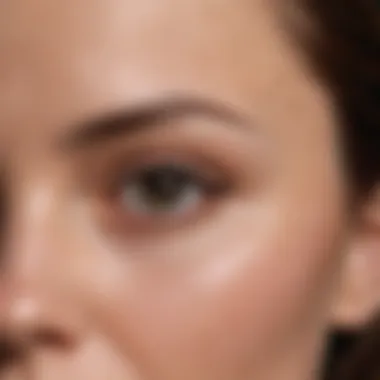The Ultimate Guide to Female Hair Loss Treatments: Effective Solutions Unveiled


Beauty Tips and Tricks
When tackling the distressing issue of female hair loss, it is essential to delve into effective beauty tips and tricks specifically tailored to address this concern. Skincare routine tips play a crucial role in creating a healthy environment for hair growth, emphasizing the significance of a meticulous daily skincare regimen to promote scalp health and overall hair quality. Incorporating haircare hacks into your routine can further aid in nourishing the hair follicles, strengthening them from root to tip, ultimately combating hair loss for improved hair vitality and resilience. Proper makeup application techniques can also contribute to boosting confidence and diverting attention from any hair thinning, offering a holistic approach to enhancing one's appearance despite hair loss.
Product Reviews
In the realm of combatting female hair loss, navigating through the multitude of skincare, makeup, and haircare products can be overwhelming. Skincare product reviews offer valuable insights into selecting the right products to maintain a healthy scalp and tackle hair loss issues effectively. Makeup product reviews can assist in choosing cosmetic products that complement your overall look while adding a touch of glamour to detract from any hair loss concerns. Exploring haircare product reviews unveils innovative solutions and potent formulas designed to nourish the scalp and promote hair growth, aiding individuals in their battle against female hair loss.
Makeup Trends
While addressing female hair loss, staying updated on the latest makeup trends can be a source of inspiration and empowerment. Seasonal makeup trends present opportunities to experiment with different looks, diverting attention from hair loss concerns by highlighting other facial features. Delving into celebrity makeup looks allows individuals to draw inspiration from iconic figures, adapting glamourous styles to suit their unique preferences. Following beauty influencer recommendations provides valuable guidance on incorporating trendy makeup techniques to elevate one's overall appearance, presenting a curated approach to beauty despite experiencing hair loss.
Expert Beauty Advice
When considering the optimal treatment for female hair loss, seeking expert beauty advice is indispensable. Professional makeup artist insights can offer nuanced approaches to makeup application that complement hair loss concerns while enhancing natural beauty. Skincare specialist recommendations provide tailored solutions to promote scalp health and combat hair loss at the root cause, focusing on holistic skincare routines that nurture both skin and hair. Hair stylist tips offer personalized advice on hair care practices, styling techniques, and suitable products to optimize hair health and mitigate the effects of female hair loss, empowering individuals to take charge of their hair care journey with confidence.
Beauty Industry News
Staying abreast of the latest developments in the beauty industry can provide valuable information on cutting-edge products and treatments for female hair loss. Product launch updates offer insights into new formulations designed to address hair loss concerns, showcasing advancements in the realm of haircare and scalp health. Beauty event coverage allows individuals to immerse themselves in the world of beauty, gaining exposure to innovative techniques and treatments that can revolutionize their approach to combating hair loss. Celebrity beauty collaborations introduce collaborative ventures between renowned figures and beauty brands, spotlighting curated collections and solutions to empower individuals in their pursuit of healthier, fuller hair despite the challenges posed by female hair loss.
Understanding Female Hair Loss
Female hair loss is a prevalent concern among many women, impacting not only physical appearance but also psychological well-being. This section of the article aims to delve deep into the intricate web of factors contributing to female hair loss, offering a nuanced analysis that equips readers with essential knowledge to navigate this issue effectively. By addressing the causes, distinguishing between shedding and actual hair loss, and understanding the impact of diet and nutrition on hair health, individuals can make informed decisions to optimize their hair growth potential.
Exploring the Causes of Female Hair Loss
Genetic Factors
Genetic factors play a pivotal role in determining an individual's susceptibility to hair loss. Understanding the genetic predispositions that contribute to hair thinning or pattern baldness is crucial for devising personalized treatment approaches. By examining the inheritance patterns and genetic markers associated with female hair loss, individuals can gain insights into their risk factors and potential interventions.
Hormonal Imbalances
Imbalances in hormone levels, particularly androgens like DHT, can disrupt the hair growth cycle and lead to hair loss. By elucidating the intricate interplay between hormones and hair follicles, this section sheds light on the significance of hormonal balance in maintaining healthy hair growth. Exploring hormonal treatments and lifestyle modifications can address underlying imbalances and promote hair rejuvenation.
Stress and Lifestyle Choices
Chronic stress, unhealthy habits, and lifestyle choices can exacerbate hair loss in women. By evaluating the impact of stress on hair health and delineating the role of lifestyle factors in hair maintenance, individuals can proactively mitigate these risk factors. Implementing stress management techniques and adopting hair-friendly habits can safeguard against unnecessary hair shedding and promote optimal growth.
Medical Conditions
Certain medical conditions such as thyroid disorders, alopecia areata, and autoimmune diseases can trigger hair loss in women. Understanding the mechanisms through which these conditions affect hair follicles enables targeted treatment strategies and monitoring. By addressing the root causes of hair loss stemming from medical conditions, individuals can work towards restoring their hair density and vitality.


Medical Treatments for Female Hair Loss
Female hair loss is a prevalent concern that can take a toll on one's confidence and overall well-being. In the quest for effective solutions, medical treatments play a crucial role in addressing this issue comprehensively. By exploring prescription medications, hormone therapy, and platelet-rich plasma (PRP) therapy, individuals can access advanced options to combat hair loss.
Prescription Medications
When delving into the realm of prescription medications for female hair loss, two prominent choices arise: Minoxidil (Rogaine) and Finasteride (Propecia). These medications have garnered attention for their potential to stimulate hair growth and inhibit further hair loss.
Minoxidil (Rogaine)
Minoxidil, commonly known as Rogaine, is a topical solution approved by the FDA for treating female pattern hair loss. This medication works by enhancing blood flow to the scalp, revitalizing hair follicles, and promoting hair regrowth. The key characteristic of Minoxidil lies in its ability to be applied directly to the scalp, making it a convenient choice for individuals seeking non-invasive treatment options. However, like any medication, Minoxidil may have side effects such as scalp irritation or unwanted hair growth in unintended areas.
Finasteride (Propecia)
Finasteride, also known as Propecia, is an oral medication that inhibits the formation of DHT, a hormone responsible for shrinking hair follicles in conditions like female pattern hair loss. Its key characteristic lies in its ability to target the hormonal pathways affecting hair loss, offering a systemic approach to treatment. While Finasteride has shown efficacy in promoting hair growth, it is crucial to be aware of potential side effects such as sexual dysfunction.
Hormone Therapy
In the realm of hormone therapy for female hair loss, options like Birth Control Pills and Anti-Androgen Medications emerge as significant contenders. These treatments focus on balancing hormonal imbalances that may contribute to hair loss, offering a specialized approach to addressing this concern.
Birth Control Pills
Birth Control Pills, commonly used for contraception, can also have a positive impact on hair health. By regulating hormone levels, particularly androgens like testosterone and dihydrotestosterone (DHT), Birth Control Pills can help mitigate hair loss in some individuals. The unique feature of Birth Control Pills lies in their dual functionality of preventing pregnancy while potentially improving hair quality. However, it is essential to consult a healthcare provider before initiating this treatment to assess its suitability and potential side effects.
Anti-Androgen Medications
Anti-Androgen Medications work by blocking the effects of androgens on the hair follicles, thus preventing their damaging impact on hair growth. These medications target specific hormones implicated in hair loss, offering a targeted approach to combating this condition. While Anti-Androgen Medications show promise in halting hair loss and fostering regrowth, they may also pose risks of hormonal imbalances and associated side effects.
Platelet-Rich Plasma (PRP) Therapy
Platelet-Rich Plasma (PRP) Therapy utilizes the healing properties of platelets present in the individual's blood to stimulate hair follicles and encourage hair growth. By harnessing the body's natural regeneration process, PRP therapy offers a safe and minimally invasive treatment option for female hair loss.
Mechanism of Action
The mechanism of action underlying PRP therapy involves drawing blood from the patient, processing it to concentrate platelets, and injecting the resulting platelet-rich plasma into the scalp. This concentrated plasma contains growth factors that promote hair follicle regeneration and stimulate hair growth. The key characteristic of PRP therapy lies in its personalized approach, utilizing the individual's own blood components to enhance hair health. While PRP therapy is generally well-tolerated, individuals should be aware of potential side effects such as minor discomfort at the injection sites.
Effectiveness and Potential Side Effects
Studies have indicated the effectiveness of PRP therapy in promoting hair growth and improving hair thickness in individuals experiencing hair loss. This natural treatment option offers a promising solution for enhancing hair health without the need for synthetic medications. However, it is vital to note that individual responses to PRP therapy may vary, and some individuals may experience temporary redness or soreness post-treatment.
Natural Remedies and Lifestyle Changes
In the realm of female hair loss treatment, natural remedies and lifestyle changes play a crucial role in enhancing hair health. These approaches offer gentle yet effective methods to address hair loss concerns while promoting overall well-being. By incorporating organic products and lifestyle adjustments, individuals can support the natural vitality and growth of their hair. Embracing natural remedies and lifestyle changes is a holistic way to manage female hair loss that complements other treatment modalities, providing a comprehensive approach to hair care.


Essential Oils for Hair Growth
Lavender Oil
Lavender oil stands out for its versatile benefits in promoting hair growth and improving scalp health. Known for its calming aroma and soothing properties, lavender oil helps reduce stress levels, a common contributing factor to hair loss. Additionally, its anti-microbial properties assist in maintaining a healthy scalp environment, fostering optimal conditions for hair follicles to thrive. The gentle nature of lavender oil makes it a popular choice in addressing female hair loss, offering a natural and nurturing solution to enhance hair health.
Rosemary Oil
Rosemary oil is a renowned natural remedy for stimulating hair growth and improving circulation to the scalp. Its invigorating scent and potent antioxidants help nourish hair follicles, promoting stronger and healthier hair from the roots. Rosemary oil is valued for its ability to increase scalp circulation, which can revitalize hair follicles and potentially reduce hair shedding. Incorporating rosemary oil into a hair care routine can invigorate the scalp and contribute to overall hair health.
Peppermint Oil
Peppermint oil is recognized for its refreshing aroma and cooling sensation, making it a popular choice for promoting hair growth and scalp health. Its energizing properties help stimulate hair follicles, encouraging hair growth and thickness. Peppermint oil also has anti-inflammatory effects, which can soothe scalp irritation and reduce dandruff, fostering a conducive environment for healthy hair. By incorporating peppermint oil into a hair care regimen, individuals can enjoy the benefits of improved scalp health and potentially enhanced hair growth.
Scalp Massage Techniques
Scalp massage techniques offer a therapeutic approach to promoting hair growth and maintaining scalp health. The benefits of scalp massage include increased blood flow to the scalp, which can nourish hair follicles and support hair growth. Regular scalp massages can also help relax the scalp muscles, reducing tension and potentially decreasing hair shedding. By implementing proper scalp massage techniques, individuals can create a spa-like experience at home while nurturing their hair and scalp health.
Benefits of Scalp Massage
The benefits of scalp massage extend beyond relaxation, encompassing improved circulation, stress relief, and potential promotion of hair growth. Scalp massage can help distribute natural scalp oils, keeping the hair and scalp hydrated and nourished. By incorporating scalp massage into a routine, individuals can enhance hair health, relax tense scalp muscles, and potentially reduce hair loss.
Proper Massage Techniques
Proper scalp massage techniques involve gentle yet firm pressure applied in circular motions to the scalp. Using fingertips or a massage tool, individuals can stimulate the scalp, promoting blood circulation and relaxation. It is essential to massage the scalp in a consistent and rhythmic manner to maximize the benefits and ensure thorough coverage. By adopting proper massage techniques, individuals can optimize the effects of scalp massage and contribute to overall scalp and hair health.
Nutritional Supplements for Hair Health
Nutritional supplements play a vital role in supporting hair health and combating hair loss from within. Certain vitamins and minerals are essential for nourishing hair follicles, promoting hair growth, and maintaining strong, healthy strands. Integrating nutritional supplements into a balanced diet can help address deficiencies that may contribute to hair loss and improve the overall condition of the hair.
Biotin
Biotin, also known as Vitamin B7, is a key nutrient that supports the growth and strength of hair. As a popular supplement for hair health, biotin helps convert nutrients into energy, which is essential for promoting hair growth. Biotin deficiency can lead to hair loss and thinning, making it pivotal in maintaining healthy hair and preventing hair-related issues. By incorporating biotin supplements into a daily routine, individuals can fortify their hair from within and support optimal hair growth.
Vitamin
Vitamin D plays a crucial role in hair follicle cycling and may influence hair growth and shedding patterns. Adequate levels of Vitamin D are essential for maintaining healthy hair follicles and supporting the hair growth cycle. Insufficient Vitamin D levels have been associated with hair loss conditions, emphasizing the importance of this nutrient in promoting robust and vibrant hair. By ensuring adequate Vitamin D intake through supplements or sunlight exposure, individuals can support their hair health and potentially minimize hair loss.
Omega-3 Fatty Acids
Omega-3 fatty acids are essential fats that contribute to overall health, including hair health and growth. These nutrients help nourish hair follicles, reduce inflammation in the scalp, and promote healthy hair development. Incorporating Omega-3 fatty acids into a diet can aid in strengthening hair strands, improving scalp condition, and potentially limiting hair loss. By including sources of Omega-3 fatty acids, such as fish or flaxseed oil, individuals can enrich their diet with vital nutrients for optimal hair health and vitality.


Professional Treatments and Procedures
In the realm of female hair loss treatment, professional treatments and procedures play a vital role in providing effective solutions. These interventions offer advanced methods and specialized techniques to address hair loss concerns with precision and efficacy. Professional treatments and procedures are conducted by skilled experts in dermatology and hair restoration, ensuring personalized care and tailored approaches for each individual's unique needs. By opting for professional treatments and procedures, individuals can benefit from the latest advancements in hair restoration technology and innovative therapeutic options.
Hair Transplant Surgery
Hair transplant surgery, a prominent professional treatment for female hair loss, encompasses various techniques aimed at restoring natural hair growth. One such technique is Follicular Unit Extraction (FUE), a sophisticated procedure that involves extracting individual hair follicles from donor areas and transplanting them to the recipient site. FUE is lauded for its minimally invasive nature and ability to deliver natural-looking results. The key characteristic of FUE lies in its precision and ability to harvest hair follicles without leaving visible scars, making it a preferable choice for individuals seeking discrete hair restoration solutions. Despite its advantages, FUE may entail a longer duration for transplanting a significant amount of follicles, and its success can be influenced by the surgeon's expertise and the patient's hair characteristics.
Another prominent technique within hair transplant surgery is Follicular Unit Transplantation (FUT), a method involving the removal of a strip of scalp tissue, from which hair follicles are extracted and transplanted. FUT stands out for its capability to transplant a large number of hair follicles in a single session, making it a time-efficient option for comprehensive hair restoration. However, FUT may result in a linear scar at the donor site, necessitating longer recovery time compared to FUE. Understanding the unique features and potential drawbacks of FUT is crucial in evaluating its suitability for individual preferences and desired hair restoration outcomes.
Laser Therapy
Laser therapy is recognized as a non-invasive treatment modality for enhancing hair growth and addressing hair loss concerns. Low-Level Laser Therapy (LLLT) stands out as a popular method used in clinics and at-home devices for stimulating hair follicles and promoting hair regrowth. The key characteristic of LLLT lies in its ability to penetrate the scalp tissues and stimulate cell activity, thereby increasing blood flow to the hair follicles and promoting hair growth. LLLT is favored for its safety profile and ease of application, offering a convenient adjunct to traditional hair loss treatments. However, the effectiveness of LLLT may vary among individuals, highlighting the importance of consistency and adherence to treatment protocols for optimal results.
Effectiveness and safety considerations are paramount aspects of laser therapy in the context of female hair loss treatment. Ensuring the efficacy of laser therapy involves understanding the mechanism of action behind LLLT and its impact on hair follicle regeneration. Additionally, prioritizing safety measures such as using FDA-cleared devices and following recommended treatment guidelines is essential in mitigating any potential risks associated with laser therapy. Evaluating the advantages and limitations of laser therapy facilitates informed decision-making regarding its integration into personalized hair care regimens.
Scalp Micropigmentation
Scalp micropigmentation is a specialized procedure that involves depositing pigment into the scalp to create the illusion of a fuller hairline or enhance existing hair density. The process overview of scalp micropigmentation includes meticulous planning of the pigment placement to achieve natural-looking results that blend seamlessly with the individual's hair color and style. The key characteristic of scalp micropigmentation lies in its ability to simulate the appearance of hair follicles, thereby concealing areas of hair thinning or baldness with precision and artistry. Scalp micropigmentation is a beneficial choice for individuals seeking immediate results and a non-invasive solution to camouflaging hair loss, offering a temporary yet realistic alternative to traditional hair restoration methods.
Results and considerations in scalp micropigmentation revolve around the visual outcomes of the procedure and the importance of prior research and consultations. Understanding the potential results and post-treatment care requirements is paramount in setting realistic expectations and maximizing the long-term benefits of scalp micropigmentation. While scalp micropigmentation offers a versatile and customizable approach to addressing hair loss concerns, individuals must weigh the permanence of the procedure and its maintenance needs to make informed decisions aligning with their hair restoration goals.
Maintaining Healthy Hair Growth
Maintaining healthy hair growth is a fundamental aspect discussed in this article outlining the best treatments for female hair loss. The condition of our hair often reflects our overall health and well-being, making it crucial to address key elements contributing to optimal hair growth. Proper hair care practices, stress management techniques, and a balanced diet with adequate hydration play pivotal roles in nurturing healthy hair growth. Implementing these practices can significantly impact the strength, vitality, and appearance of our hair, ultimately boosting our confidence and self-esteem.
Tips for Preventing Female Hair Loss
Proper Hair Care Practices
Proper hair care practices are essential components in the realm of maintaining healthy hair growth. They involve using gentle shampoos, minimizing heat styling, and avoiding over-brushing that can weaken hair strands. Incorporating regular trims to prevent split ends and using nourishing hair masks contribute to the overall health of the hair. The key characteristic of proper hair care practices lies in their ability to promote hair strength, resilience, and shine, making them a popular choice for individuals seeking to enhance their hair quality. While these practices require consistency and patience, their benefits in reducing hair breakage and improving texture are noteworthy.
Stress Management Techniques
Effective stress management is pivotal in preventing female hair loss as stress can disrupt the hair growth cycle, leading to increased shedding. Utilizing stress-reducing practices such as exercise, meditation, or engaging in hobbies can help mitigate the impact of stress on hair health. The key characteristic of stress management techniques is their ability to create a harmonious environment for healthy hair growth by reducing cortisol levels and promoting relaxation. While each individual may respond differently to stress management strategies, incorporating these techniques can significantly improve overall well-being and contribute to hair vitality.
Balanced Diet and Hydration
Maintaining a balanced diet rich in essential nutrients and staying hydrated is imperative for healthy hair growth. Nutrients like biotin, vitamin D, and omega-3 fatty acids play crucial roles in nourishing the hair follicles and promoting hair strength. Adequate hydration ensures that the scalp remains moisturized, supporting optimal conditions for hair growth. The key characteristic of a balanced diet and hydration lies in their ability to supply the hair with essential vitamins and minerals necessary for growth and regeneration. While dietary preferences may vary, prioritizing nutrient-dense foods and sufficient water intake can enhance hair quality and thickness.
Consulting a Hair Specialist
Importance of Professional Advice
Seeking professional advice from a hair specialist is vital in addressing female hair loss efficiently. Hair specialists possess specialized knowledge and experience in diagnosing hair conditions, tailoring treatment plans, and recommending suitable interventions. Their expertise enables individuals to receive personalized guidance on managing hair loss based on their unique needs and concerns. The key characteristic of professional advice is its role in providing accurate assessments and evidence-based recommendations, offering reassurance and clarity to those navigating hair loss. While the initial consultation may involve assessments and discussions, the guidance and support received from a hair specialist can significantly impact treatment outcomes and overall satisfaction.
Customized Treatment Plans
Customized treatment plans designed by hair specialists are tailored solutions to address individual hair loss concerns effectively. These plans encompass a range of interventions such as topical treatments, nutritional recommendations, and in-clinic procedures based on the specific needs of the patient. The key characteristic of customized treatment plans lies in their ability to target the root causes of hair loss, providing comprehensive solutions that address both symptoms and underlying issues. While the effectiveness of these plans may vary depending on the individual's response, the personalized approach ensures that treatment strategies are tailored to optimize results and promote long-term hair health.







